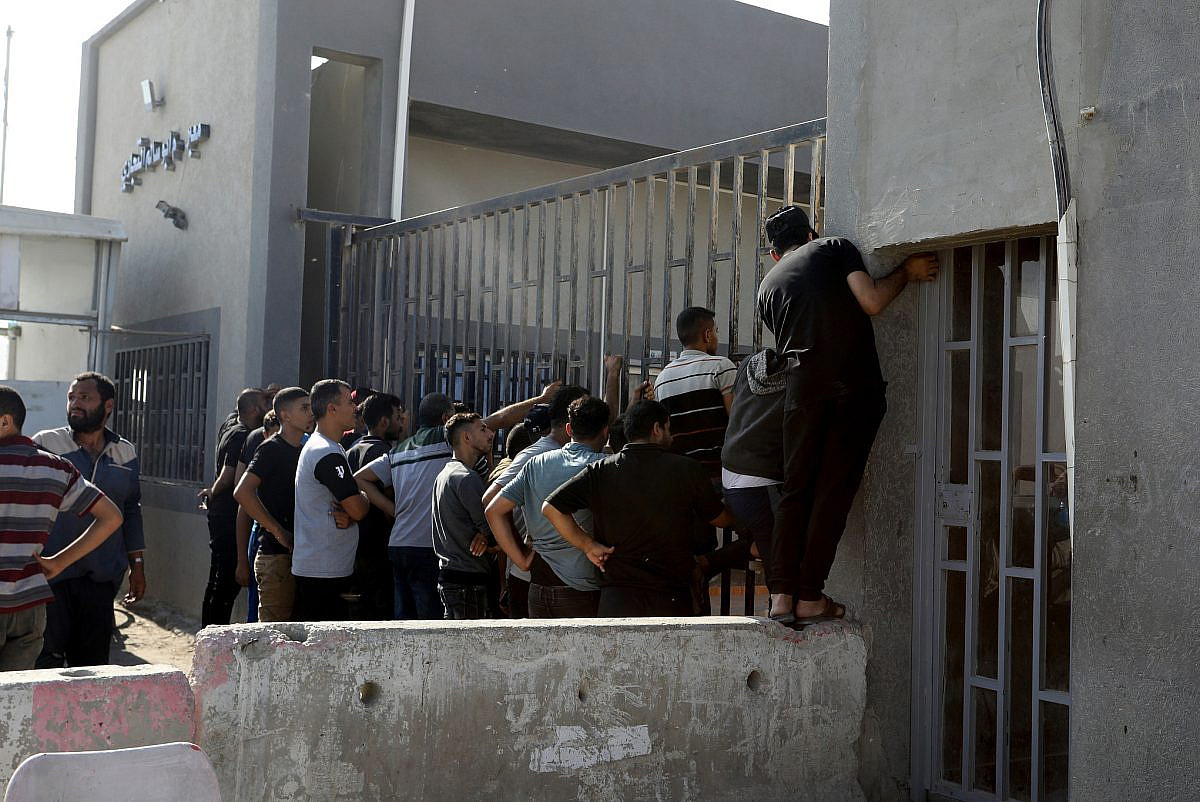At the start of October, 20-year-old Hiyam (not her real name) left Gaza for the first time. Her older brother, Mohammed (not his real name), suffered from leukemia, and the pair had been granted hard-to-come-by permits to enter Israel so he could receive specialized treatment that is not available in the Strip due to Israel’s longstanding blockade.
At the hospital in central Israel, Mohammed initially received good care: staff were attentive and friendly, and his condition appeared to be improving. “I thought we were going to go back to Gaza with him on his feet, and that it would all soon be over,” Hiyam said wistfully, her eyes looking around as if trying to find that hope again.
On Oct. 8, however — one day after Hamas-led attacks on southern Israel killed over 1,100 Israelis, and Israel began bombarding Gaza — Mohammed’s condition worsened rapidly. Suddenly, he was bleeding uncontrollably, and despite Hiyam’s desperate attempts to alert medical staff to his situation, no one seemed to be paying any attention. Within hours, Mohammed was dead.
It was only after her brother’s death that Hiyam learned about the outbreak of the war. The siblings had been so focused on Mohammed’s condition that they were unaware of the situation unfolding just a few miles away — a development that has left Hiyam trapped in limbo, navigating near-insurmountable bureaucratic obstacles while grieving the loss of her brother.
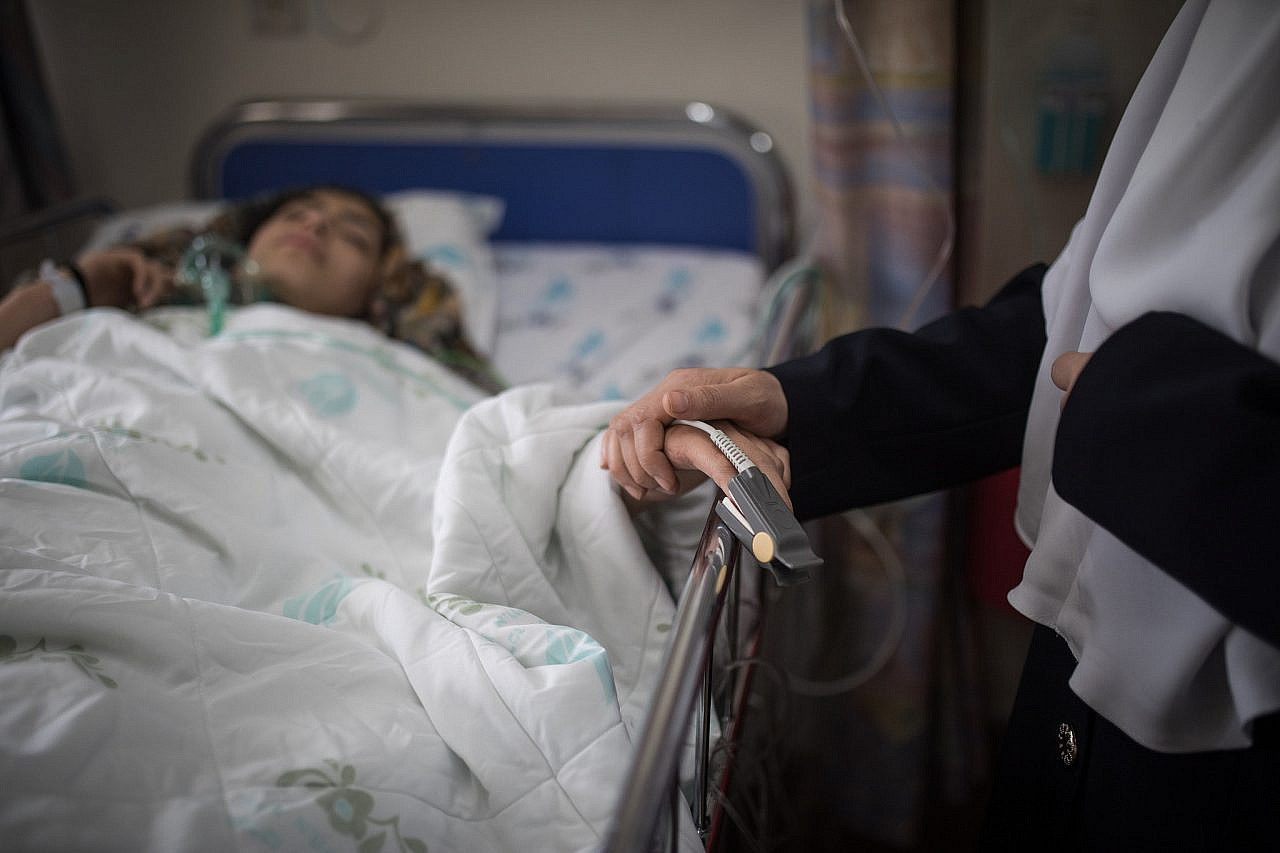
For two days, Hiyam wandered aimlessly around the hospital until staff insisted on her departure. With the help of another Gazan woman she encountered, Hiyam managed to secure an ambulance to transport her brother’s lifeless body to Ramallah in the occupied West Bank, where he was laid to rest. Four months later, Hiyam is still in Ramallah, unable to return to Gaza as the war rages on — and she’s not the only one.
According to Augusta Victoria Hospital, more than 120 Palestinians who entered Israel from Gaza before October 7 — either as patients receiving medical care or as their chaperones — are stranded at hospitals in East Jerusalem, unable to return to the Strip but defined by Israel as illegal residents due to the expiration of their entry permits.
Fifty-one Gazan cancer patients at Augusta Victoria have been staying, permitless, at the hospital grounds or in rented accommodation nearby since the war started. “Every one of them has lost someone dear, and many are hoping to get back to Gaza,” Dr. Yousef Hamamreh, an oncologist at the hospital, told +972.
According to Hamamreh, over 100 additional patients from Gaza were supposed to arrive for their cancer treatment plans in the weeks following October 7, but were unable to get out of the Strip after Israel sealed the border crossings. Hamamreh explained that he is keeping a close eye on the patients who arrived before the war, whose pain amid the losses in Gaza has been compounded by the restrictions on their movement. The result, he said, has been a “grave impact on their mental and psychological well-being.”
Around 70 more Gazan patients and their chaperones are stuck in the West Bank, according to the Palestinian Health Ministry; most of them were already receiving treatment at West Bank hospitals before October 7, but a handful were being treated at hospitals in Israel and were forced to relocate after the war started. In their struggle to return to their families in the besieged Gaza Strip, they are joined by several thousand workers whose permits Israel revoked as soon as the war began — victims of a bureaucratic system of control that severely impedes the freedom of movement of Palestinians in the occupied territories, and dictates where and when they are allowed to travel.
‘Pieces of a family’
In Ramallah, Hiyam’s story echoes through the halls of the modest hotel where she has been staying since burying her brother’s body, along with dozens of patients and their relatives who arrived from Gaza before the war began. Some of the occupants are waiting to return to Gaza, while others are continuing their treatment plans at Palestinian hospitals in the West Bank.
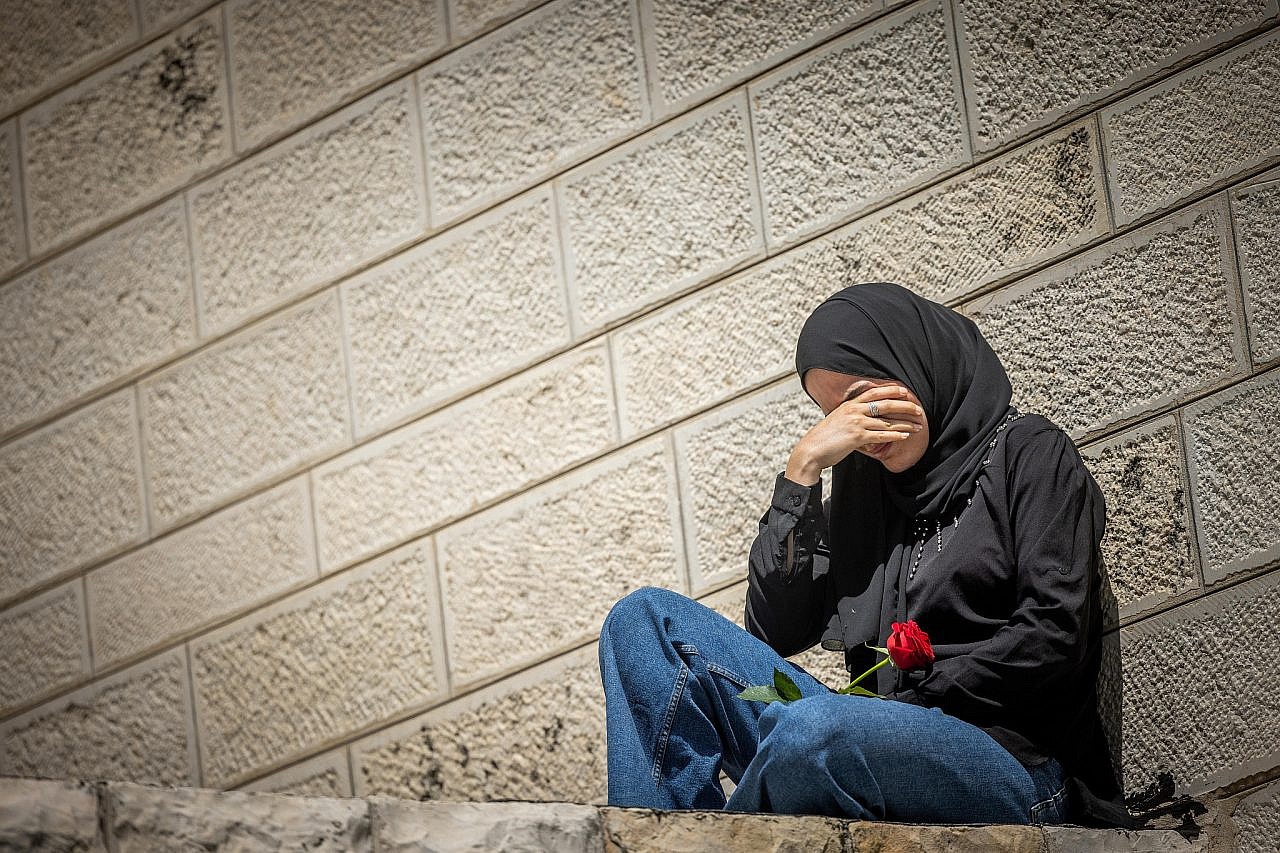
It was here that Hiyam met Hana Matar, a 43-year-old cancer patient and mother of four. Matar has had to travel to the West Bank periodically over the last three years for her medical care. When she arrived in Ramallah on Oct. 3 for the latest installment — together with her 3-year-old son, Khalil, who has a heart condition that also requires specialized care in the West Bank — she couldn’t have imagined that they would still be there over four months later.
With tears in her eyes as she scrolled through photos of her daughters on her phone, Matar described a bittersweet twist in her family’s story: her brother, a doctor living in Russia, managed to issue her daughters with visas allowing them to evacuate Gaza. Matar’s three children and her mother are now in Moscow — safe, but thousands of miles away.
“They had been stranded in a UN school in Deir al-Balah and then in Rafah, shivering from the cold and neglect. Now they are in the snow, but warm,” Matar said, looking at a picture of her eldest daughter in Moscow, dressed in a coat, headscarf, and tinted sunglasses.
Matar’s husband, however, remains in Rafah, awaiting his chance to be listed for evacuation and to reunite with his children. With her husband in Gaza, her children and mother in Russia, and herself with Khalil in Ramallah, Matar described feeling like “pieces of a family.” For the time being, however, she has no choice but to stay in the West Bank; leaving would require obtaining special permits for her and Khalil to cross into Jordan, while the cost of both of their treatments anywhere else in the world would be unaffordable.
In the meantime, Matar, Hiyam, and the rest of the Gazans stranded in Ramallah — less than 60 miles from their homes in the Strip — are receiving piecemeal updates from friends and family. Intermittent telecommunications blackouts in Gaza have reduced these updates to the barest messages, mostly via SMS, which often only arrive hours or days after being sent.
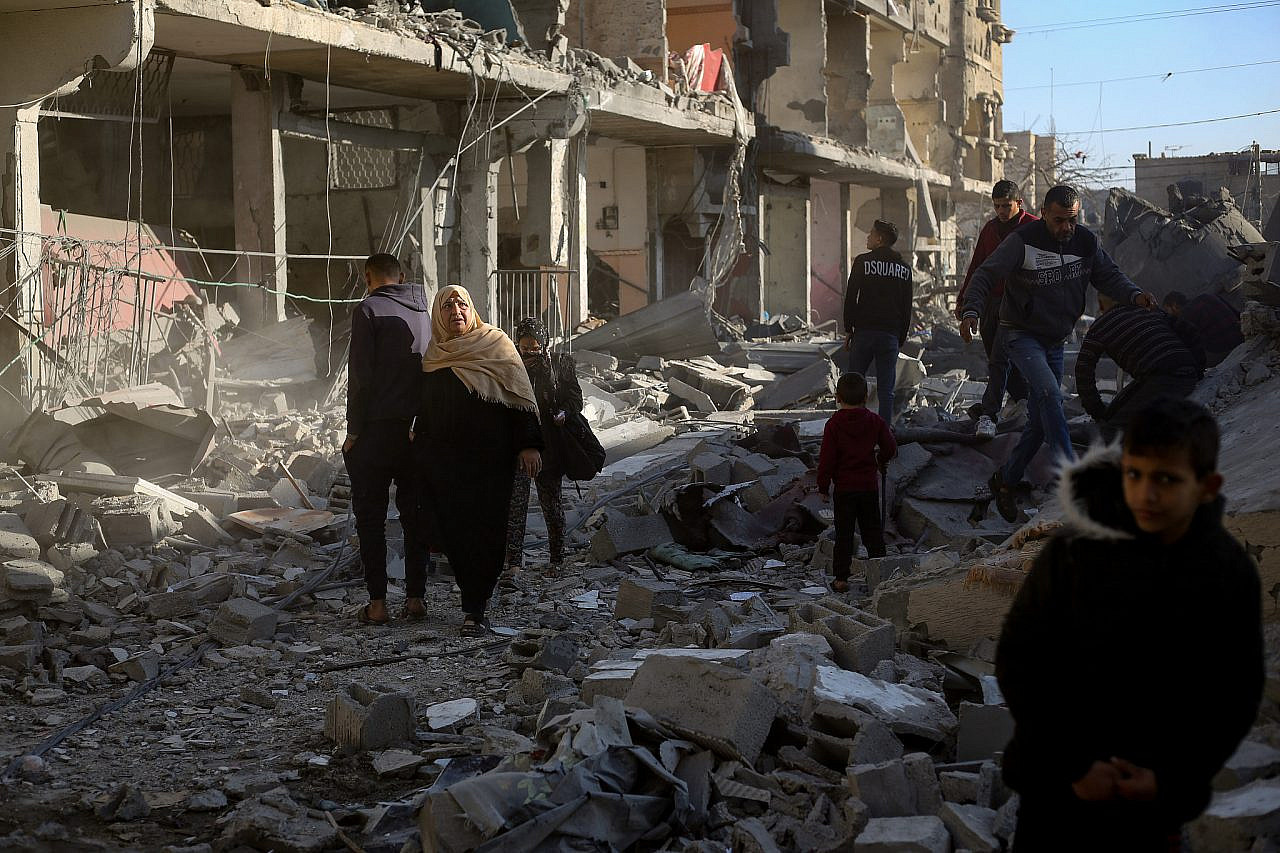
“Our conversations have dropped to stating: ‘I’m alive and I’m okay.’ That’s all,” Matar said. “Even our big life decisions, like evacuating my mother and daughters, are made with few words, just thinking of safety.”
No work, no safety
In addition to these medical patients and their companions, thousands of laborers from Gaza were also in Israel or the West Bank on October 7. They, too, have found themselves detained in Israel and forcibly moved to the West Bank, their permits having been revoked.
Before October 7, Israel issued over 18,000 work permits to Gazans, providing a precarious economic lifeline for a lucky few to escape the Strip’s stifled economy. Following the attacks, workers were detained en masse; most were held for weeks without charge or trial, and without the Israeli authorities disclosing any information to humanitarian organizations, including the International Red Cross. They were later released into Ramallah.
The Palestinian Authority (PA) says it secured the return of over 5,000 workers to Gaza in several batches since October, while a similar number have been released directly by the Israeli authorities since November. A few thousand workers remain in the West Bank, many of whom are staying at the PA police academy headquarters in the city of Jericho.
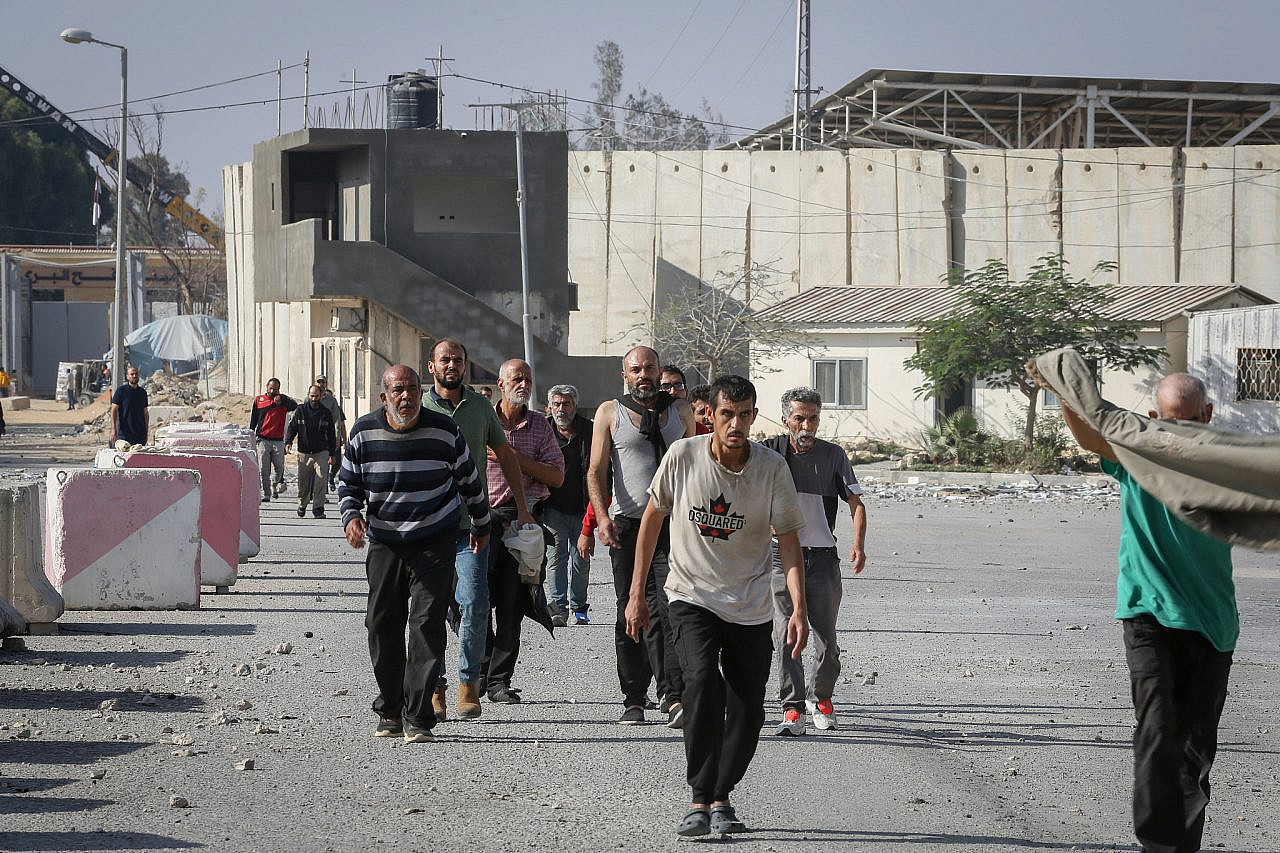
The workers who returned to Gaza say they were bussed back to an area several miles from the Kerem Shalom/Karem Abu Salem checkpoint, compelled to walk the remaining distance to Gaza’s southernmost city of Rafah on foot. This was one final humiliation, adding to the traumatic experience of their prior detention which involved being handcuffed, blindfolded, and made to kneel for long hours, as well as deprived of food. Some were beaten, and many also had personal items confiscated, including ID cards and money.
Tareq, 48, was among those able to go back to Gaza. “We were given a choice to return, so I decided to return to Gaza even though I didn’t know who I’d find still there,” he told +972. “We were an influx of exhausted men longing to walk into Gaza even though it’s no longer what it was, and this feeling gave us the power to run — sometimes it felt like flying — toward the crossing despite the beatings and the humiliation.”
Tareq spent nearly 10 days in Israeli detention after October 7 without knowing where he was. He was only released after suffering a stroke: he was transferred to a hospital in Ramallah, where he spent five weeks in recovery. According to Tareq, when he was left at the hospital, he was only given back his ID card but not his money, medication, or phone.
“For 10 days we were squeezed into tiny areas, handcuffed, with no water and little food, and not allowed to speak to each other. I barely knew who was with me,” he recounted. Now, back in Gaza, he is living in a makeshift tent that he built for his family of eight in Rafah.
Hasan Yasin, 40, was working in a supermarket in Jaffa when the war broke out. Realizing that there was no safety for him there, nor any imminent prospects of returning to work, he and four colleagues attempted to enter the West Bank a few days later, but they were caught and arrested.
Most read on +972
According to Yasin, the men were detained for the whole day, and heavily beaten. They were eventually released to a checkpoint near Jenin, but his personal belongings — including his phone and money — were not returned to him.
After that ordeal, Yasin decided to stay in the West Bank and look for a job, despite pleas from his family to return to Gaza. “The workers who returned were beaten and humiliated, and I decided not to go through that again,” he told +972. “I still have a wound in the palm of my hand that reminds me of what could happen.”
Nonetheless, Yasin is seeking alternative means of returning to Gaza: “I’m going to try to travel to Egypt and enter Gaza via Rafah [crossing], but I can’t get through [the West Bank crossing] to Jordan.” Palestinians from Gaza are obligated to obtain a special permit in order to enter Jordan via Allenby Bridge, but these are not currently being issued, according to a Jordanian border official, in an attempt to prevent “possible Israeli [population] transfer plans.”
+972 approached Israel Police and the Coordinator of Government Activities in the Territories (COGAT) — the department of the Israeli military responsible for issuing permits to Palestinians — for comment. Their responses will be published here if and when they are received.


